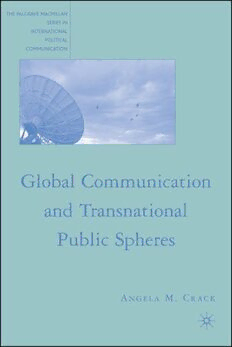
Global Communication and Transnational Public Spheres PDF
245 Pages·2008·1.144 MB·English
Most books are stored in the elastic cloud where traffic is expensive. For this reason, we have a limit on daily download.
Preview Global Communication and Transnational Public Spheres
Description:
Information and communication technologies (ICT) enable citizens to communicate across state borders with greater ease than ever before, exciting much speculation about the emergence of transnational public spheres. This highly original work introduces this debate to International Relations, by investigating the socio-political implications of ICT in a global governance framework. Classic Habermasian theory is radically reconstructed to take account of contemporary trends in state sovereignty and global civil society. It is argued that if access is not widened and free speech not sufficiently protected, the early promise of ICT as a liberating force will be neutralized.
See more
The list of books you might like
Most books are stored in the elastic cloud where traffic is expensive. For this reason, we have a limit on daily download.
